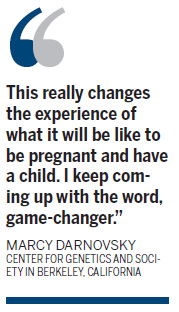Society
Blood test may unlock secrets of the womb
Updated: 2011-06-14 08:00
By Malcolm Ritter (China Daily)
|
|
NEW YORK - Imagine being pregnant and taking a simple blood test that lays bare the DNA of your fetus. And suppose that DNA could reveal not only medical conditions such as Down syndrome, but also things like eye color and height. And the risk for developing depression or Alzheimer's disease. And the chances of being homosexual.
So far that remains science fiction. But scientists have been taking some baby steps in that direction. And some ethics experts say it is time to start talking now about what that could mean for parents and society.
Scanning fetal DNA from a blood test will be "without question a major medical advance that promises to greatly improve current prenatal care", said Jaime King, an associate professor at the University of California Hastings College of Law in San Francisco, who studies genetic testing. Bringing it into practice, however, "raises significant practical, legal, ethical and social challenges", she said.
"This really changes the experience of what it will be like to be pregnant and have a child," said Marcy Darnovsky of the Center for Genetics and Society in Berkeley, California. "I keep coming up with the word, game-changer."
She wonders if parents would withhold their commitment to a pregnancy until test results show a fetus is "good enough" to be born. And what, she asked, is good enough?
She and others worry about how well couples will be able to understand this flood of information, and just what should be revealed.
The issues have been discussed before. The DNA of a fetus has long been recoverable through medical procedures, but with the small risk of miscarriage. But a blood test would be free of that risk, which should make many more women interested in it and doctors willing to test for a wider range of conditions, some experts say. And the results could come early enough to allow for an abortion before the pregnancy is even obvious.
The trigger for the new round of discussion is a couple of papers published last December. In preliminary results, two research teams showed that they could essentially reconstruct a baby's genetic makeup by recovering fragments of fetal DNA from the mother's bloodstream. That ability, plus the rapidly falling cost of analyzing DNA, would open the door to inspecting individual genes.
That would go well beyond the more accurate prenatal blood test for Down syndrome that some companies hope to market within a year.
Within five to 10 years, doctors may be able to test for between 100 and 200 diseases, albeit many of them are rare, estimates Stanford University law professor Hank Greely, who studies the implications of biomedical technologies.
Prenatal testing "is going to put a lot more information about the genetics of a child into the hands of a lot more parents", King said.
That knowledge has a flip side. "How much responsibility are we expecting people to take for the genetic makeup of any child they might have?" asked Josephine Johnston, a research scholar at the Hastings Center, a bioethics think tank near New York City.
If a child is born with a condition that could have been detected, the presence of the test changes that outcome "from something that happened to you, to something that you participated in", she said.
"That's a very big burden to place on would-be parents," she said, adding that it is difficult for a pregnant woman to refuse any test for a medical condition because taking tests feels like the responsible thing to do.
Associated Press
(China Daily 06/14/2011 page10)
Specials

Wealth of difference
Rich coastal areas offer contrasting ways of dealing with country's development

Seal of approval
The dying tradition of seal engraving has now become a UNIVERSITY major

Making perfect horse sense
Riding horses to work may be the clean, green answer to frustrated car owners in traffic-trapped cities
